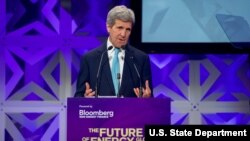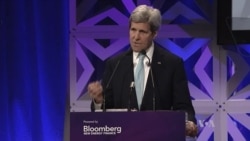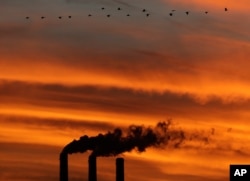U.S. Secretary of State John Kerry touted the administration's policy of clean energy on Tuesday, saying that more than four times as many Americans are employed by renewable energy companies than by the fossil fuel industry. He pointed to an encouraging sign: a global surge in clean energy investment hit an all-time high — despite low prices for oil, coal and gas.
“Make no mistake. This isn’t only happening in the industrialized countries. In fact, emerging economies like China, India and Brazil invested even more in renewable technologies last year than the developed world. China alone invested more than $100 billion,” Kerry said at a clean energy forum in New York.
He noted that even oil-rich countries like Saudi Arabia and the United Arab Emirates are committed to diversifying their energy use, and Kerry said they are increasing the share of renewable energy in their fuel mix at unprecedented rates.
Nevertheless, only a little more than 10 percent of the world’s energy was generated by renewables due to the existing energy infrastructure. Kerry called it an “unacceptable level of inefficiency.”
Late last year, the U.S. Congress passed a five-year extension of the production and investment tax credits for solar and wind installations.
The U.S. government also finalized rules to limit the amount of carbon pollution being emitted by new and existing power plants, making investment in harmful energy sources less attractive than cleaner alternatives.
Still, the administration’s efforts to promote clean energy choices continue to face political hurdles.
For example, the government of Florida currently is suing the Obama administration over the limits it has placed on carbon pollution from power plants.
“No lawsuit or election or business deal will undo the progress we’ve made to date, or divert the path we’ve forged toward a clean energy future,” said Kerry.
The Obama administration issued a fact sheet Monday on the connection between climate change and human health, outlining the high cost and adverse impact that environmental degradation has on hospital bills. It warns that “air pollution and airborne allergens will likely increase, worsening allergy and asthma conditions."
It also states that rising temperatures and changes in weather extremes are “expected to increase the exposure of food to certain pathogens and toxins.”
The White House has designated the period from May 23 to May 27 as “Extreme Heat Week" — during which time federal agencies "will take a number of actions to work with community planners and public-health officials to enhance community preparedness for extreme heat events."







